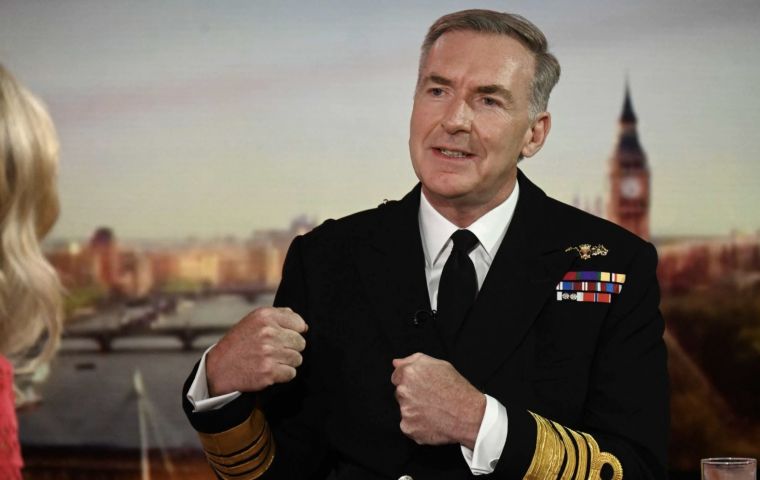MercoPress. South Atlantic News Agency
UK Armed Forces are not 'spare capacity' for striking workers, Admiral Sir Tony Radakin
 Sir Tony Radakin said it would be “an unusual position for us to arrive at” if the military were to be used routinely in the event of strikes by public sector workers
Sir Tony Radakin said it would be “an unusual position for us to arrive at” if the military were to be used routinely in the event of strikes by public sector workers The Head of the Armed Forces, Admiral Sir Tony Radakin, has warned that it would be “slightly perilous” to expect the British military to regularly stand in for striking public sector workers. He’s told The Sunday Telegraph that personnel are “not a spare capacity”.
Sir Radakin added: “We’re busy and we’re doing lots of things on behalf of the nation. We’ve got to focus on our primary role.”
It has been confirmed that 1,200 military personnel will be used to cover striking ambulance and Border Force staff in the coming weeks. Their duties will be split between driving ambulances and checking passports, while around 150 will provide logistical support.
Sir Tony has said that deployment is “miles off” impacting operational effectiveness, but it “has an impact on individuals and we have to acknowledge that”. Earlier in the week, the Defence Secretary was accused by his Labour counterpart, John Healey, of using the military “too often” to cover industrial action.
In response, Ben Wallace told the Commons: “I will do the right honourable gentleman a deal. “I’ll raise that at Cobra, if he tells his union paymasters to not go on strike over Christmas and not ruin the lives of our soldiers and sailors.“
The Prime Minister also acknowledged the effect the strikes will have on the military. Speaking at RAF Conningsby this week, Rishi Sunak said: ”I had the opportunity to say thank you to some of our Armed Forces personnel because many of them are going to miss Christmas to help us deal with the disruption from strikes.
“Whether that's manning border posts or driving ambulances, and we all owe them an enormous debt of gratitude.”
Mr Sunak also refused to rule out extending “tough” new anti-strike laws to prevent walkouts by emergency service workers, such as nurses.
Some 1,400 military personnel filling in for strikers
The number of Armed Forces personnel filling in for other public sector members on strike currently stands at around 1,400 – although there's potential for a total of 2,500 to be deployed.
Giving evidence to the Public Accounts Committee, Permanent Secretary to the Ministry of Defence (MOD) David Williams gave a breakdown of those already committed.
Around 600 personnel have already received training to take on Border Force roles – supporting efforts such as passport control at key points of entry. Six hundred more are in live training to drive ambulances in support of five NHS ambulance trusts in England.
Finally, it's thought just under 200 will bolster fire and rescue services in specialist roles, with the MOD “scoping out” more for general duties here, according to Mr Williams.
“It's possible there may be some request for assistance from the devolved administrations,” said Mr Williams – adding that 2,500 troops had been “notionally earmarked” in case Maca (Military Aid to Civil Authorities) requests arrive from Scotland, Wales and Northern Ireland.
The committee heard that the cost to departments calling on this MOD support would amount to around £4,000 a week, per individual deployed to assist. Using these figures, a week's worth of role-filling due to strikes, with the current 1,400 deployed at once, would see a bill from defence for £5.6m.
Were 2,500 personnel to be deployed, a weekly bill could be £10m, although Mr Williams doubts that number would be required. As the MOD pays the wages of those filling in, the committee asked why a full cost recovery was necessary in this instance.
Mr Williams explained how full cost recovery, as opposed to marginal cost recovery like the method used for Maca requests during Covid, is used to encourage departments to call on the private sector rather than the military, for whom it is illegal to strike.
When it comes to filling in for roles like these, the Armed Forces should be seen as a “last resort”, he added.




Top Comments
Disclaimer & comment rules-

Read all commentsRADAKIN...?
Dec 19th, 2022 - 05:30 pm 0What kind of RUSSKI surname is that...!
You better obey PUNJABI PM SUNAK..., capisce...?
(Geeeeee..., these foreigners have no respect for good auld Engrish Rank & File...)
Commenting for this story is now closed.
If you have a Facebook account, become a fan and comment on our Facebook Page!